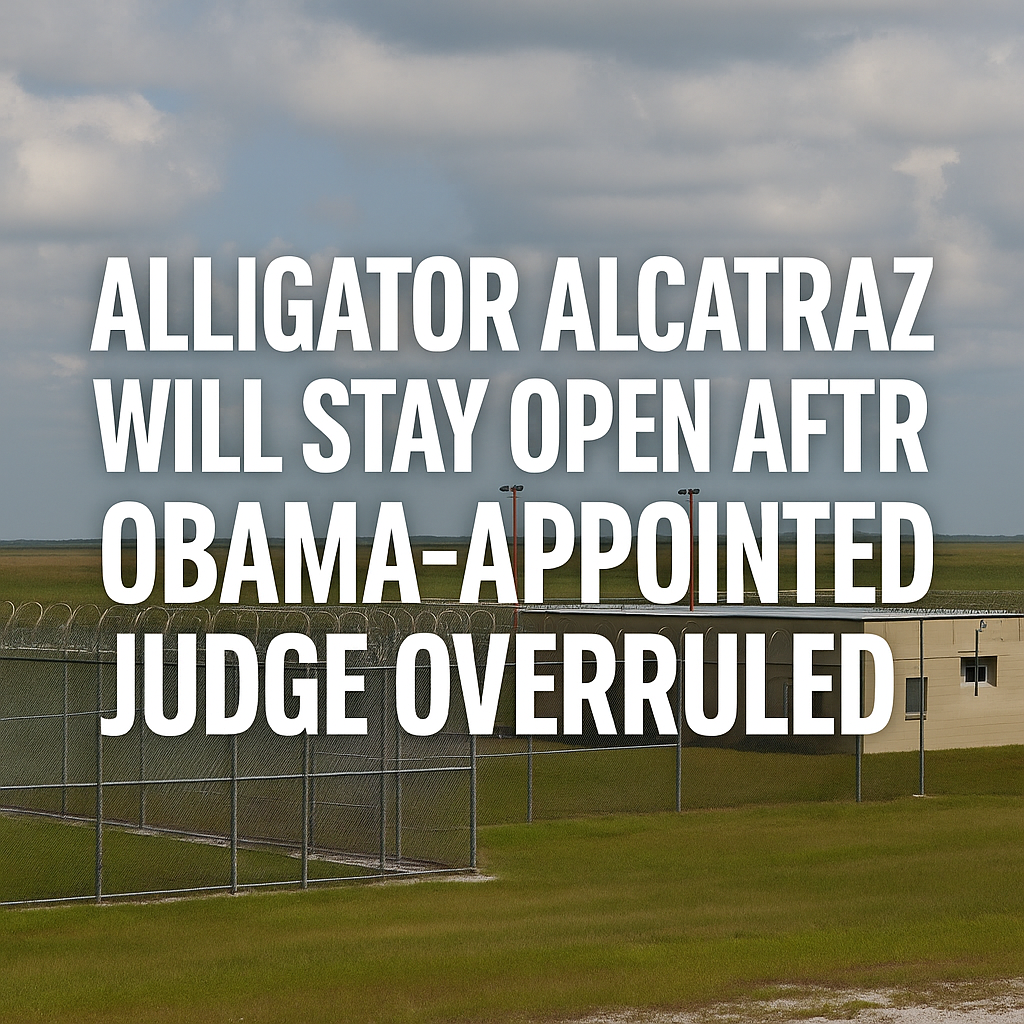Alligator Alcatraz Will Stay Open After Obama‑Appointed Judge Overruled
In a striking affirmation of both the rule of law and common‑sense immigration enforcement, the controversial Everglades detention center known as “Alligator Alcatraz” will remain operational—at least for now.
The Eleventh Circuit Court of Appeals has issued a stay on a lower court’s closure order, allowing Florida and federal authorities to continue running the facility during the appeal process. This legal vindication underscores the gravity of America’s immigration crisis and the necessity of forthright, principled solutions.
Stop Supporting Woke Cell Phone Companies
Make the switch to PureTalk. I am saving over 50%
Keep your phones, and phone numbers:
Plus – Get 2nd month for FREE with promo code: FLSFREE
https://GoPureTalk.Com
The closure order, issued by U.S. District Judge Kathleen Williams, would have forced the state and federal government to dismantle the facility within 60 days—a directive the appeals court found unreasonable. Judges Barbara Lagoa and Elizabeth Branch, both appointed by President Trump, cited “irreparable harm” to Florida’s ability to handle what Governor DeSantis has deemed an “immigration crisis of unprecedented magnitude.” Moreover, they emphasized that the project did not yet constitute a “major federal action” requiring an Environmental Impact Statement—there had been no federal spending yet.
In a powerful dissent, Judge Adalberto Jordan—appointed by President Obama—argued that the court had improperly usurped the lower court’s fact‑finding role and minimized the federal government’s involvement in the project. He asserted that Department of Homeland Security’s requests, ICE inspections, and assurances of reimbursement were sufficient to trigger environmental review under NEPA.
From a conservative Christian perspective, this ruling respects both stewardship and justice. The rule of law must prevail over emotion—and due process must not be sacrificed to political symbolism. Governor DeSantis rightly underscored that halting operations now would squander millions in taxpayer money and leave the immigration system overburdened, a point the appeals panel supported.
Critics, including environmental groups and leaders of the Miccosukee Tribe, warn of ecological harm in America’s unique wetlands. Yet the appeals panel reaffirmed that the site was already a working airfield with thousands of flights, complicating claims of undue environmental disturbance.
According to state legal authorities, dismantling the site would cost upwards of $15–20 million. Moreover, Florida Attorney General James Uthmeier hailed the court decision as a victory against judicial overreach from what he framed as an “activist judge.”
At its core, the ruling highlights a vital truth: the government must honor its responsibility to protect the nation’s borders—even when the path forward is difficult. The facility’s location deep within the Everglades—surrounded by natural barriers like swamps, pythons, and yes, alligators—reflects a practical, if unconventional, strategy. From a Christian stewardship lens, preserving resources—especially financial and security resources—is prudent governance.
Meanwhile, environmental and tribal stakeholders emphasize the absence of adequate impact studies. Yet Christian conservatives understand that stewardship entails discernment—balancing ecological care with the protection of citizens. Complete paralysis is neither godly nor safe.
As this case moves up the appeals ladder, it raises pressing questions about how America balances sanctuary with sovereignty, compassion with accountability, and stewardship with security. Alligator Alcatraz stands at the crossroads—an emblem of the broader debate.
This legal victory does not mean the fight is over. Appeals will proceed, and both sides will present their cases. Still, for now, the stay ensures that Florida can continue to manage detainees—supporting deportation efforts, protecting border integrity, and safeguarding taxpayers.
The court’s decision preserves a pragmatic and necessary tool for national security. It also reinforces that courts should not impose sweeping mandates that undermine executive and legislative judgment, particularly when lower courts have not clearly abused their discretion.
Ultimately, Christian convictions compel us to safeguard the vulnerable—but also the sovereignty that protects them. Alligator Alcatraz, for all its controversy, embodies a tough but faithful approach to a difficult reality.


